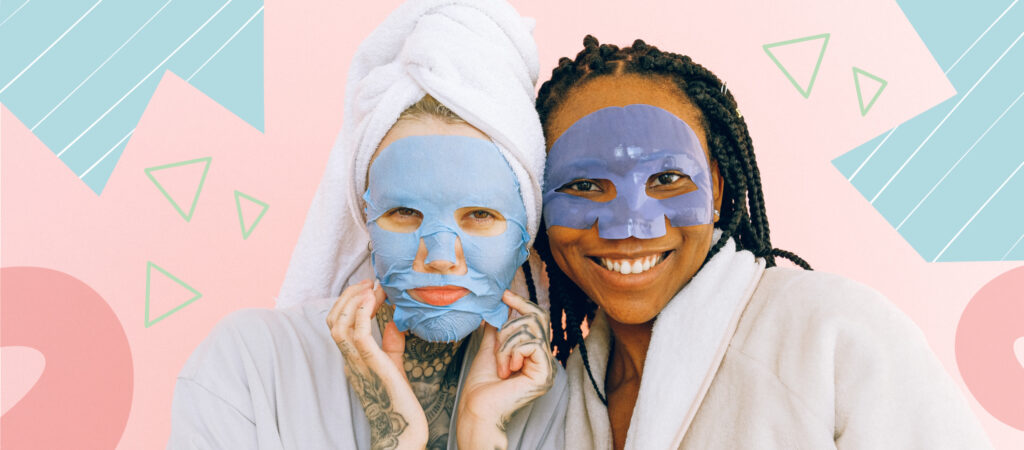Must-Haves Vs. Don’t-Needs When It Comes to a Solid Skincare Routine

Medically reviewed by Dr. Nancy Shannon, MD, PhD on August 9, 2021
Building an effective skincare routine may seem super-confusing, since no two people have the exact same skin and there are so (so very) many products to choose from. But while it’s true that skin types may do better on specific formulations, there is a core set of products that all skincare routines should include.
Just as there are a few universal must-haves, there are also some products that don’t deserve a place in your cabinet. Here’s a what’s what of the products your skin does need, and can do without.
- Must-Have: Cleanser
This one is a no-brainer. Over the course of a day, sweat, oil, dirt, and even air pollutants can build up on the surface of your skin. If left there for too long, these substances can cause acne formation or even damage pores.
Nurx offers prescription treatment for acne, anti aging, melasma, rosacea, and eyelash growth.
Cleansers are essential for clearing your skin of any buildup, but how you use them depends on your skin type. Those with sensitive or dry skin should only use cleansers once per day (and preferably in the evenings) in order to prevent possible agitation. Those with oily skin could cleanse their face up to twice per day, morning and evening, but usually once a day before bed is fine and even preferable to twice a day, because it is possible to “over-wash” your face. In general, oil-free cleansers are better, particularly for those with a history of greasy skin.
- Don’t-Need: Makeup Remover
It’s important to remove makeup from the face at the end of the day, but the fact of the matter is that makeup removers generally don’t do anything that cleansers can’t already. Products like micellar water can function both as a cleanser and makeup remover, negating the need to spend time and money investing in both.
- Must-Have: Moisturizer
Healthy skin is hydrated and moisturized skin, period. Dehydrated skin is dry and wrinkly, like a raisin. Skin that isn’t properly hydrated overcompensates by producing more sebum, the oil-like mixture of fats found in pores. Dehydrated skin can lead to wrinkles, acne, and a host of other issues no one wants to deal with. It’s important to stay well-hydrated with adequate water intake.
Skin that lacks moisture can appear dry and flaky. Moisturizers work by creating a barrier over the skin to lock in hydration. Picking the right moisturizer will depend on the natural hydration levels of your skin in general. Those with dry skin will want to opt for thicker, moisturizers while those with more balanced or oily skin could use thinner products such as lotions. Look for moisturizers that are labeled “non-comedogenic,” which means they do not clog pores. Avoid greasy ointments (that feel like petroleum jelly, as these are quite thick and can clog the pores, leading to pimple-like break-outs).
- It’s Complicated: Serums
Hydrating serums have become increasingly popular because of their purported benefits: in addition to hydrating, some serums also claim to prevent wrinkles, even out pigmentation, or protect from sun damage. While these effects may occur for some, it’s important to note that serums are very similar to moisturizers when it comes to hydrating the skin.
Where serums can benefit certain skin types is in their concentration of active ingredients. A serum is typically lighter and delivers active ingredients to the skin quickly, but it does need to be sealed in with moisturizer to maximize benefits. If you’re looking to treat dullness, fine lines, or discoloration, a serum might be helpful for you. However, if these aren’t your skin concerns, you could likely skip.
- Must-Have: Sunscreen
Unmitigated sun exposure is an enemy to skin health. Aside from causing wrinkles, dark spots, and, agitating rosacea flare-ups, too much time in the sun without proper protection can also increase your risk of developing skin cancer. Sunscreen is a must-include for all skincare routines, but people who use prescription skin treatments should take special notice: many common acne medications like topical retinoids (also used for anti-aging) and antibiotics can make your skin even more sensitive to sun exposure, further underscoring the need for sunscreen.
Broad-spectrum UVA/UVB SPF 30 is the minimum, and if you experience rosacea or have sensitive skin you might consider “mineral” sunscreens that contain titanium or zinc oxide. Try to avoid any sunscreens that contain fragrances, as they can also act as irritants.
- Don’t-Need: Day Cream
Day creams often function as a kind of combination moisturizer and sunscreen, though it’s just as effective to use two separate products instead. Day creams, despite their name, usually have a weak SPF, if they even have one at all. Day creams also have a tendency to be oil-based, making them off-limits for oily skin types. That said, if having moisturizer and SPF combined in a “day cream” makes you more likely to use sunscreen then it may be a great choice for you. Just know that you don’t need a “day cream” and if you do use one make sure it’s not oil-based and is labeled “non-comedogenic,” which means it will not clog pores.
- It’s Complicated: Toner
While toners are often listed as a cornerstone of any good skincare routine, the truth is a bit more complicated. The point of a toner is to even out the composition of the skin on the face, but this may not actually be a necessary step for everyone. Those with balanced or dry skin will probably find that a toner dries out their skin too much. If you think that the oil levels across your face are somewhat uneven, you might benefit from using a toner on the oily spots — otherwise, don’t worry about it. Toners can be irritating for individuals with sensitive or rosacea-prone skin.
If you have a chronic skin condition like rosacea or acne, your skincare routine may require a little extra fine-tuning. Get in touch with one of our skincare experts here at Nurx today to learn more about what products may work best for you.
This blog provides information about telemedicine, health and related subjects. The blog content and any linked materials herein are not intended to be, and should not be construed as a substitute for, medical or healthcare advice, diagnosis or treatment. Any reader or person with a medical concern should consult with an appropriately-licensed physician or other healthcare provider. This blog is provided purely for informational purposes. The views expressed herein are not sponsored by and do not represent the opinions of Nurx™.





